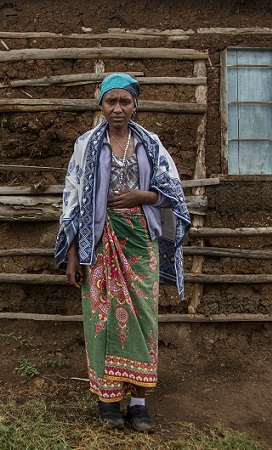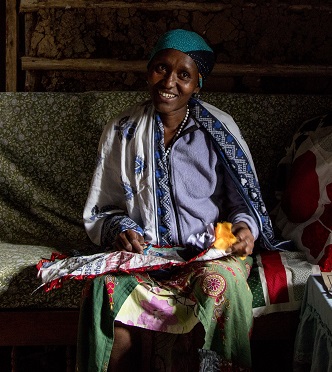Merry, grocery business entrepreneur
Before joining Hand in Hand, Merry had been running a grocery business selling fruit, vegetables, snacks and fish for many years but had always felt she, and the business, were held back by her lack of education.
When she was younger, she wanted to be an accountant – but was not allowed to go to secondary school. “I could not succeed because of at that time there were traditions and customs that made people believe a girl child cannot study.” Merry explains.
The Hand in Hand business training programme with its focus on financial management, bookkeeping and marketing provided Mary with the skills she had known she needed and today she says, “After learning how to invest savings…how to budget and how to avoid unnecessary spending…the business has grown.”
Merry proudly explains that when she started the Hand in Hand programme, she had TZS 50,000 (US $21) and now she is confident she can save up to TZS 300,000 (US $126).
Things have changed at home too. Thanks to the gender-specific training module, which men and community leaders in the village also took part in, Merry’s husband is now helping her with domestic tasks, giving Merry more time to run her business.
Merry explained that, growing up, her husband believed it wasn’t a man’s to help his wife. “But, after getting the Hand in Hand education, about the responsibilities we had to help each other, he understood.”
The training has given Merry the confidence to take control of her business and speak out and have her say. “There are men who, in the beginning, think a woman does not have the right to become a leader. But now, women are equal. A woman has the same right to study as a man and she also has the right to do any job that a man can do.”
Martha and Jerimiah
The Hand in Hand programme Making Change Together, funded by Cartier Philanthropy, which combined business training with challenging traditional gender stereotypes, has changed both the fortunes of, and the relationship between, Jeremiah and his wife, Martha for the better.
The couple live in rural Arusha, Tanzania, where the most people survive on under USD 2.15 a day – and men typically have the final say inside and outside the home.
Jeremiah and Martha met 13 years ago at the restaurant where she worked. As soon as they were married however, they slipped into their traditional roles where Martha took care of the house, the farm and the children and Jeremiah supported them all with the income he earned fixing telephones. Jeremiah explains that, just like everyone else, he thought, “I should not help my wife with the cooking, cleaning, washing or getting the children ready for school.” But now, after the training, Jeremiah says, “These duties belong to all of us, and, even if it’s not every day, I should help my wife when she’s overwhelmed.”
Martha also says the training opened her eyes to the pressure Jeremiah had been under to support them all financially, “I used to be a housewife. But now, after the training, I know it is important for me as a mother to work and help my husband.”
Now they are working as a team, Martha can see that their fortunes will improve too, “If we work together then we’ll be able to get out of renting houses.”
As for Jeremiah, he is a convert to a new way of living, “All men should come and get the Hand in Hand training…That way we can have a new system of cooperation in families.”
Veneranda and Wilfred
Life for Veneranda Mushi, her husband Wilfred and their three children is changing – they are adding a second room to their house, building a toilet and the children have all the clothes, shoes and books they need for school.
Before joining Hand in Hand, there was never any question that Veneranda would earn money or that Wilfred would take care of the children to enable her to do so.
After her business skills training, Veneranda started a small business buying and selling groceries, but, after taking part in gender specific training, Wilfred realised that if she grew the vegetables herself, they could make more money. So, for the first time, Wilfred gave Veneranda a plot of land for her to grow vegetables, which she could then take to market.
Today Veneranda’s business earns about TZS60,000 (USD 25) a week – tripling the family income. Two days each week Veneranda takes her produce to the market and Wilfred stays at home to look after the children, take care of the chickens and cook the meals. Working as a team has relieved the pressure on Wilfred to be the sole breadwinner, and made life easier for everyone.
From entrepreneur to community leader
Christina Mombuli, from Meru District, Tanzania, overturned expectations of what a women’s role ‘should be’ to succeed not just as an entrepreneur but as a leader.
Before joining Hand in Hand, Christina and her husband struggled to afford daily necessities – earning just below the international poverty line of USD 1.90 per day. Now, after taking part in business skills training and starting to manufacture and sell soap, toiletries and beaded jewelry, Christina has increased her family’s income twelvefold.
However, for Christina, the biggest transformation of all is in her confidence and leadership skills. Gender discrimination is commonplace in the Meru district where Christina lives, and, traditionally, women don’t hold positions of power within the community. Thanks to leadership training from Hand in Hand, Christina is now a well-respected local leader. She serves on the Village Council, on the Meru District Council, as the chairperson of her local Mother’s Union Unit, and is the only female board member for a milk processing company.
“I was a leader before I started the training,” Christina explains. “But I hardly knew any leadership techniques, so I was scared to dare and take risks. Hand in Hand gave me direction and now I recognize my duties and my responsibilities as a leader.”
For Christina, leadership means helping women come together solve their problems as a group, and demand change. “Collective action helps us exercise voice and choice. It is a route to local problem-solving,” she adds.
In areas where literacy levels are low, Hand in Hand trainers use storytelling and parables to help women memorize new techniques quickly. “Through the workshop I gained confidence which I was missing greatly, due to cultural norms of our community but also due to lower levels of education.”
Now, Christina is using her position to advocate for the next generation. Many girls in the district miss out on an education if their parents can’t afford the school fees, or if they have to travel a long distance to the nearest school. As a District Councillor Christina is backing a scheme to build a new girls boarding school in the district. “This will be without much cost to their parents who have a lower level of income” Christina says.
‘I want to be a real entrepreneur’: Anita
Take the road out of Arusha in the foothills of Mount Neru. Head south to Olkeriani and keep going until you hit the edge of town. Keep moving past the end of the tarmac, past the last of the cinderblock homes, and arrive at a building made from sticks and plastered with mud. Look for the woman with a lifetime in her eyes.
Anita Msele has been up since 5am, when she rose to make maize and chai tea for her sons. Aged 41, and with a full day’s labour ahead of her, she passed on the maize. “I think of the boys and I can’t eat,” she says. “I can’t let them go to school hungry.” It’s nearly midday.
Outside under a soil-thumping sun, young patches of maize, spinach and sugarcane struggle towards harvest, still months away. Inside, Anita’s young tailoring business also struggles to get off the ground. It was the same story last year when she tried selling socks at the market, and the year before that selling shoes, second-hand, door-to-door.
Anita feeds you tea with sugar, and when you ask her what worries her, leads you outside and pokes at her home’s foundations. A small piece comes crumbling to the ground. The home was built in 2005, she says, the same year her husband died. “At night in the wind and the rain the roof leaks and the house moves. We can’t sleep – it could fall down at any moment.”
Olkeriani, Tanzania
Gathering shadows

Anita outside the family home.
Anita is not hungry by choice. She is trying her hardest – and doing an incredible job – in a world that treats her as surplus and a climate that’s hostile to her survival. Like every one of us, she needs help.
Nine percent of households in and around Olkeriani earn their income solely from business – owning a shop, for example, or transporting people or goods on boda bodas (motorcycle taxis). Fifteen percent earn some of their income from business. The rest, 76 percent, rely entirely on farming to see them through, many at the subsistence level. And time’s not on their side.
Rainy and dry seasons cause boom-and-bust crop cycles: little followed by less followed by none. As the climate worsens, those cycles are becoming harder to predict and almost impossible to manage. For the 55 percent of Anita’s neighbours who live below the poverty line, the need to adopt climate-resilient farming practices and diversify sources of income is dire – and exactly where Hand in Hand aims to help.
A path to success

Anita sewing at home.
When Anita joined her Self-Help Group three months ago it wasn’t the lure of income that sold her but the promise of companionship. Still, as the training the progressed, she began to feel a glimmer of (was it?) hope.
“The training’s been mind-opening. I understand now about buying and selling. I understand about saving some of the money I earn,” says Anita.
“I want to get out of this situation where I have to beg for everything. I want the children to go to school so that they can achieve their goals. I want to be a real entrepreneur. So I will stick with Hand in Hand.”
With the dry season looming, she still has a long way to go. But for the first time in a long time – down the road from Arusha, at the edge of Olkeriani, past the end of the tarmac, near the cinderblock homes – the distance doesn’t seem too far.
